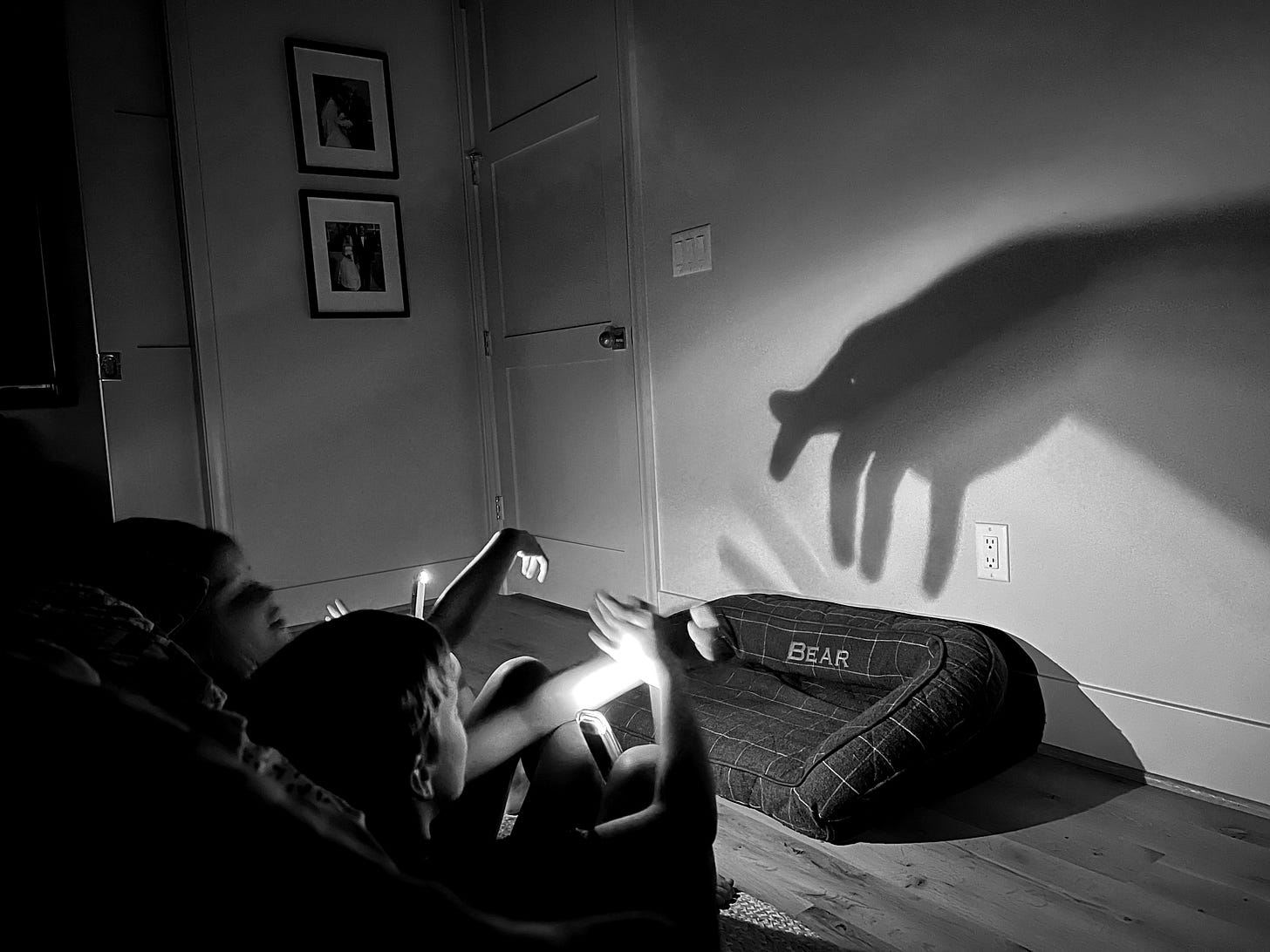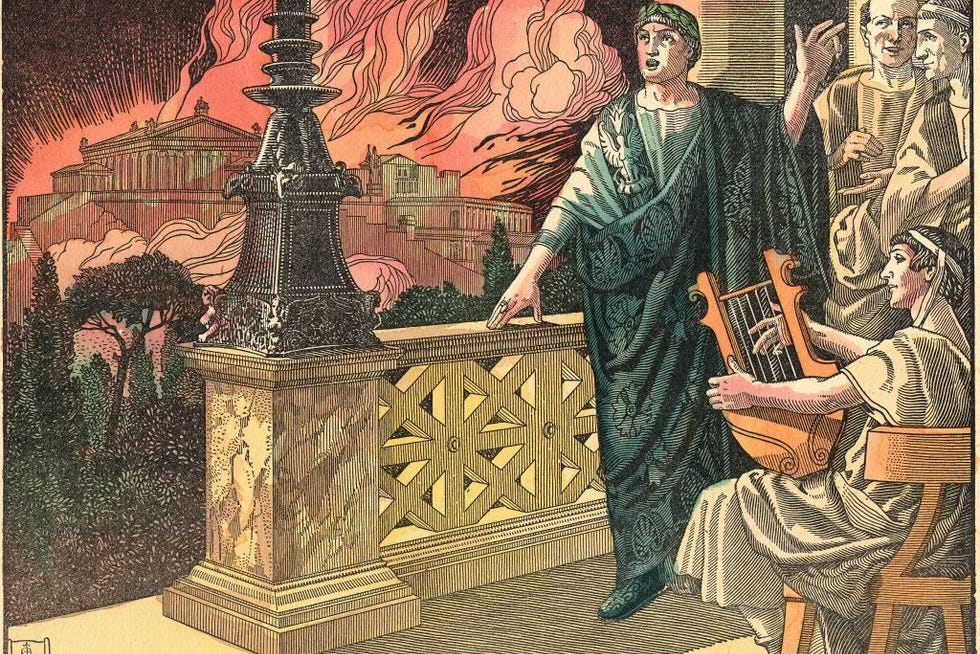Life is weird. I’m writing from Boston, where my family of six is sharing two connected hotel rooms. We had no plans to come here until a few days ago, after Hurricane Helene ripped through our city.
Last Friday morning (nine days ago), my husband and I sat on the living room sofa, watching two specific trees near our back door sway in the angry winds. Toward our house, away from our house. Toward our house, away from our house. I could hardly breathe as our kids, unfazed, made shadow puppets against our bedroom wall.
We live on a few acres in the suburbs of Greenville, South Carolina. We moved there because it was a forest, and my husband loves trees, and we wanted our kids to disappear into the woods for hours at a time. The hurricane cost us between 50 and 60 trees. A giant oak landed on our fence, another across our driveway.
Last year, in Hurricane Emily, we lost 15 trees. We no longer live in a forest.
We thought this was heartbreaking. And then we walked around our neighborhood.
Massive trees are down everywhere, and so many of them are on houses. We’ve glimpsed the bedrooms of houses from their caved-in roofs, pink tufts of insulation bursting from walls like stuffing from a ripped teddy bear. We’ve seen cars smashed like empty coke cans. On the day of the hurricane, we listened to sirens wail past again and again, until the siren-scream was just background noise.
Those two trees we watched for an hour never fell. We got so, so lucky.
And Greenville isn’t the worst of it. The stories I’ve heard out of Asheville (about an hour away) seem too sad to believe. Roads and shops and houses have become lakes, and yet people in their homes have no water to drink.
The day after the hurricane, my sister’s family moved in with us because we had a generator powering part of our house. The two of us kept comparing the days after Helene to the early days of covid, when no one knew what was going to happen. School was canceled for a day, then two days, then a week. We took walks, stepping over debris and power lines, the world outside an eerie, still gray. We went back to conversations about survival supplies—lighters and batteries and tarps—sort of joking but betrayed by shaky voices. We made dinners out of all our frozen stuff when the freezer failed, mozzarella sticks and popcorn shrimp and edamame. The kids drank ice cream “soup” off paper plates. We called the hodge-podge dinners “feasts,” and the kids climbed on the fallen trees and piled into bedrooms to sleep and were happy and clueless.
Then my family got on a plane and flew to Boston. I feel guilty now, having left, but I didn’t at the time. It was the kids’ fall break anyway, and we rarely have big chunks of time to spend together. We tried to make the best of almost two weeks of canceled school.
In Boston, though, people hardly know what’s happening in the Carolinas. One Uber driver was following the hurricane news, but most folks are unaware, at least of the severity of it. This makes me want to go home.
Probably it was wrong of us to take our kids away from the wreckage. Now we’re posing in Fenway Park and eating cannoli while people back home are suffering. A stranger on the airplane congratulated us for “making lemonade out of lemons” for the sake of our kids, but I don’t think that’s right. We went from standing in the street strategizing with our neighbors to walking the streets of a city where no one even knows what happened. And how did that do our kids any favors?
It’s always like this; there’s always tension when we know people are suffering and yet want (and occasionally need) to make the best of our own lives. There’s tension between the ugliness of destruction and the beauty of restoration. There’s tension between the way people rise to the occasion and, an hour later, show their worst selves.
The day after the hurricane, at our favorite local grocery store, we had watched folks buy up all the produce and prepared meals just to keep the beloved store’s losses at a minimum. Inside in the dark, where local meats slowly thawed in the non-functional freezers, we heard people whisper, “We don’t need this, but they need us to buy it.”
That same night, someone stole the store’s only generator.
There’s always, always, always tension.
The city of Rome famously caught fire in the first century. In the week the fire raged, more than half the city burned to the ground. As the story goes, Rome’s infamously sadistic emperor Nero cared so little about the destruction of his city that, the whole week, he sat around playing his violin. It is perhaps history’s most famous “f-you.”
From this story (which is almost certainly a myth), we get the phrase “fiddling while Rome burns.”
In common parlance, to fiddle while Rome burns is to respond with cruel apathy in the face of others’ suffering. Playing the fiddle is worse even than doing nothing; it is adding insult to injury. To make music while your fellow humans despair is worse even than to ignore them, worse than merely looking away.
Most of us want to do something to help the world. If you’re here, reading this, chances are you’re not a huge part of the internet rage machine, spreading incendiary memes on Facebook. Chances are, you wish people would calm down, be nicer. You wish you could adjust the tenor of public conversation. You wish you could liberate and protect people in danger. You wish you could rebuild houses and cook hot meals for strangers.
The curse+blessing of living in 2024 is that we know Rome is burning all the time, somewhere.
From now on out, we will always know this. Blissful ignorance is officially an outdated concept.
In Issue 274 of The Red Hand Files, a newsletter from musician Nick Cave, he answers a question from a reader named Dan about how to create art when everything seems terrible.
We make art, Nick tells Dan, whether the world is terrible or wonderful.
“We are artists and we labour in the service of others. It is not something we do only if and when we feel motivated—we create because it is our responsibility to do so.”
I believe this—that art is tied up with responsibility. That art cares if I show up, and parenting isn’t so different. My kids need me to keep making beautiful things, and sometimes that looks like an October breakfast picnic of the world’s best egg-and-cheese sandwiches in Boston’s Public Garden.
Nick goes on to say this:
“The idea that you can’t paint because the world is 'made of war and cruelty' has to be the lamest and most faint-hearted excuse not to work I have ever heard, Dan. How will painting a f—ing picture help? — it will help because art is the noble and necessary rejoinder to the sins of the world.”
In two more days, we have to go back home to deal with our own mess. We’ll be cleaning up our yard until Christmas, and we’ll never get those trees back.
But other places will never “get clean.” Parts of Western North Carolina are just... gone. Tragedy emphasizes another one of those messy human tensions. We do have to enjoy our people, making the best out of things. If we don’t, we won’t survive.
AND we also have to remain vigilant about suffering, helping where and when and how we can. I’ll never strike the right balance, not even for a minute. I’m not Nero, but I’m no Mother Teresa either. I’m a regular human somewhere in-between.
As you can probably imagine, another reader, Paul, took offense to what Nick told Dan in Issue 274. Paul wrote,
“Help me here, have I got this right? In these exceptionally ‘perilous and urgent times,’ you recommend fiddling while Rome burns?”
What Paul is doing, I think, is collapsing a complex problem central to the experience of being human into a black-and-white binary. If we “fiddle,” aren’t we as cruel as Nero? Shouldn’t we all help all the time? To Paul, it’s so simple.
Nick re-complicates Paul’s binary. Here’s how Nick responds:
Should you fiddle while Rome burns?
“If you are a fiddler, yes. If you are a fireman, no.”
I think about this response ALL THE TIME. Do we fiddle while Rome burns? Well, it depends.
What counts as fiddling? Do you live in Rome? Do the people need to hear music, or does the fire still need putting out? Do you have a fiddle? Do you have a hose?
If you are a fiddler, you spend life one way. If you are a fireman, you spend it another.
In just four words, the phrase “fiddling while Rome burns” expresses a tension central to human existence. It’s all there, in that one expression: the idea that life isn’t fair, and we hardly ever know exactly what to do, and bad things happen to good people, and beautiful things happen in terrible times.
None of this has anything to do with us going on a family trip while neighbors are still blocked by trees from leaving their houses. Because, honestly, we should have stayed.
Well this isn’t an essay with a clean takeaway; it’s a mess of words.
It’s a mess because this thinking is happening in real time. This tension is a thing I’m always trying to work out. When life is bleak, do I wring my hands? Cry? How much do I cry? When do I get up and put on clothes? Do I donate money? How much, and to which victims? Do I pick up a chainsaw? Cook a meal? When do I go back to “regular life,” if ever? What about fun—is there ever an excuse for it when some people truly never have a moment’s peace? Where does art-making come into it all? Is music offensive to suffering people… or just the inexplicable magic they need to heal?
Do I make the best of not having power and take my family to Boston?
I’m saying, I don’t know. I’m saying, yes-sometimes-no-never-maybe.
I’m saying, it’s hard to know when and where and who and how much.
This myth of Nero fiddling while Rome burns proves that the tension is literally an ancient one. And I think what Nick Cave is getting at is that if we all do the thing we’re best at, we make room for other people to do what they’re best at.
That’s idealism, but it doesn’t change the fact that we have a responsibility to our gifts. I’m no good with a chainsaw, so this morning I’m writing my way through it. I hope, just for now, that’s ok.
If you want to help with hurricane relief, I trust these folks a whole lot.








Conundrums abound with no easy answers. Living with these questions is powerful. Thanks for surfacing the tension with real life examples. I know this tension in my body, your questions are my questions too and this discernment of when I stay and when I go. How much is enough?
Beautiful take on the tensions of life, Lindsey. Balance is hard. Feeling into what it looks like, knowing what feels off, recalibrating—it’s all part of finding what helps us feel most present to our truths and needs and those of our larger communities. Thank you for sharing. And so very glad you and your family are OK and so very sorry you and your family are living among such devastating destruction.